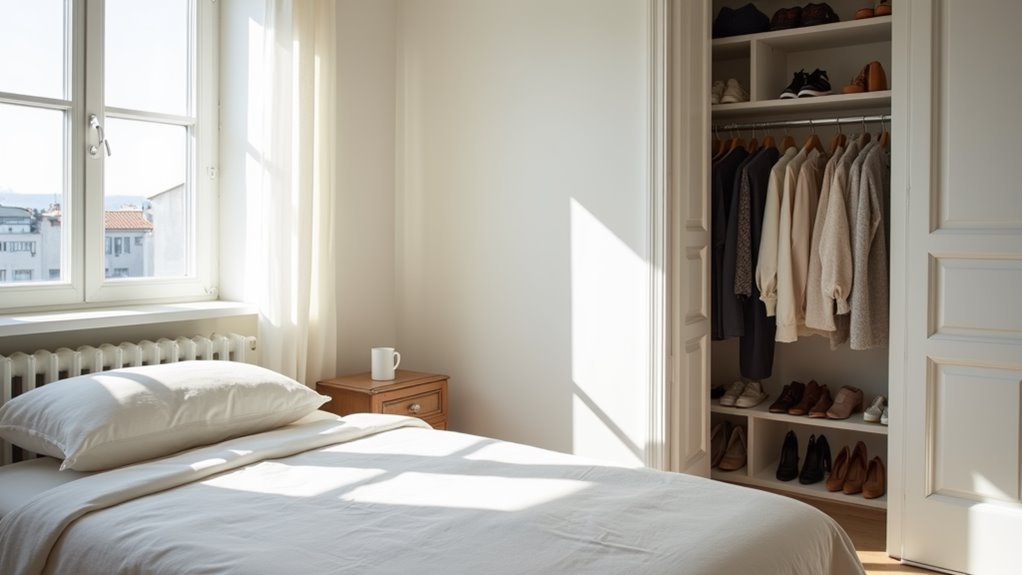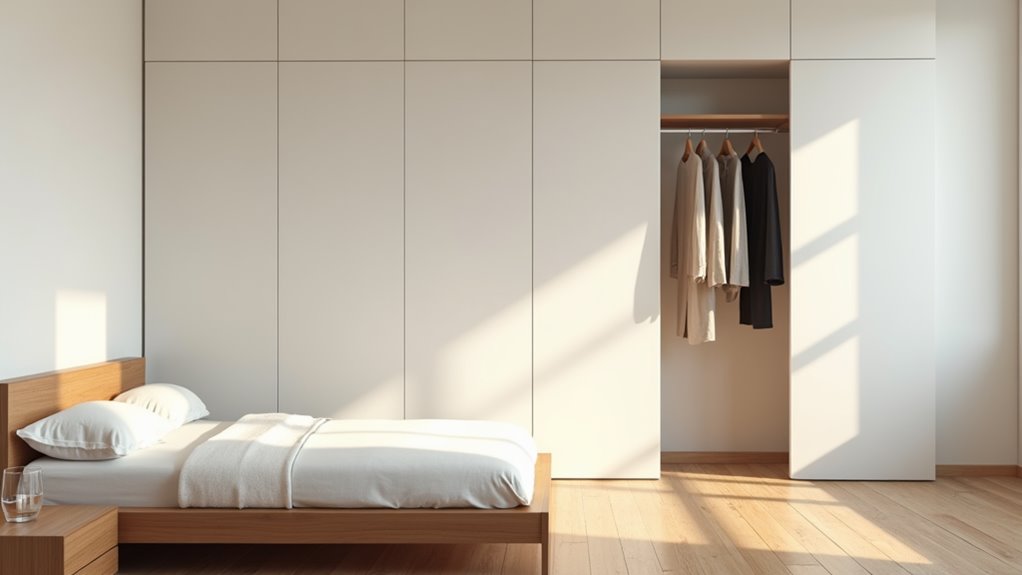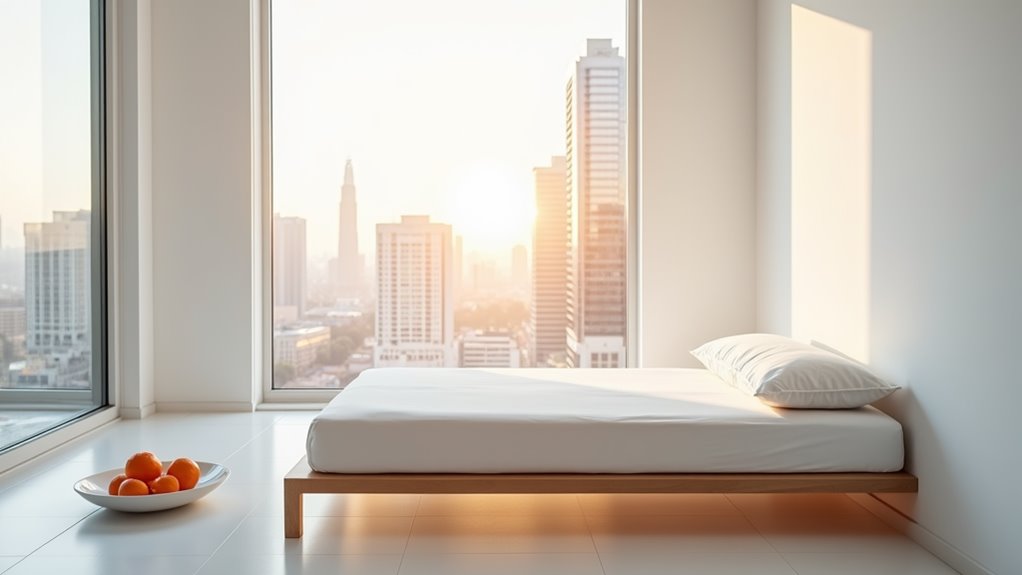You're living in an era of unprecedented abundance, where endless choices and material possessions paradoxically lead to increased stress and decreased satisfaction. This phenomenon, known as choice overload, can drain your mental energy and trigger decision fatigue, making it harder to focus on what truly matters. To combat this, you'll benefit from mindful living practices like implementing cooling-off periods before purchases, decluttering your physical and digital spaces, and aligning your choices with core values. Understanding these dynamics will help you navigate the path toward a simpler, more fulfilling life.
Key Takeaways
- Too many choices lead to decision paralysis and anxiety, while fewer options often result in greater satisfaction and decisiveness.
- Material excess creates financial burdens and psychological stress, contradicting the expectation that more possessions bring happiness.
- Mindful living and intentional decision-making help combat overwhelming abundance by focusing on genuine needs over artificial wants.
- Regular evaluation of priorities and learning to say "no" creates space for meaningful activities and reduces unnecessary commitments.
- Simplifying life by eliminating non-essential possessions and commitments promotes clarity, creativity, and deeper personal connections.
Understanding Choice Overload

Have you ever felt paralyzed while staring at endless rows of cereal boxes or scrolling through countless streaming options? This common experience is called choice overload, a psychological phenomenon where too many options lead to anxiety, decision paralysis, and reduced satisfaction with your final choice.
Your brain becomes overwhelmed when faced with excessive alternatives because it's trying to compare and evaluate each option simultaneously. This mental strain can trigger stress responses and make you question whether you're making the optimal decision.
Research shows that when you're presented with fewer choices, you're more likely to make a decision and feel content with it. Understanding choice overload helps you recognize when abundance becomes a burden rather than a benefit, allowing you to develop strategies for making decisions more effectively.
The Cost of Material Excess
While choice overload affects our mental well-being, the accumulation of material possessions creates both financial and psychological burdens. You'll find yourself spending money not just on items, but on storage, maintenance, and insurance. Each new purchase demands your attention, time, and space in your home.
Beyond the financial impact, excess possessions can trigger anxiety and stress. You might feel overwhelmed by clutter, struggle to organize your space, or experience guilt about unused items.
The weight of ownership extends to environmental concerns too – your consumption habits contribute to resource depletion and waste.
You'll often discover that material excess doesn't bring the happiness you expected. Instead, it can leave you feeling trapped in a cycle of acquisition and maintenance, while distracting you from experiences and relationships that truly matter.
Decision Fatigue in Modern Life

You're making hundreds of decisions every day, from what to wear to what to eat, and each choice gradually depletes your mental energy.
When you're faced with too many options and decisions, you'll experience decreased willpower and reduced ability to make good choices as the day progresses.
Daily Choices Drain Energy
Life in the modern world bombards us with countless decisions from morning until night. You're faced with choices about what to wear, eat, watch, read, and purchase. Each decision, no matter how small, chips away at your mental energy and willpower.
When you start your day, you've got a finite reserve of decision-making power. As you navigate through choices about work tasks, social media engagement, and daily responsibilities, this reserve steadily depletes. By evening, you might find yourself making impulsive decisions or struggling to choose at all.
That's why successful people like Steve Jobs and Mark Zuckerberg often wear the same outfit daily – they're protecting their mental energy for more important decisions. Understanding this drain can help you create strategies to preserve your decision-making power for what truly matters.
Minimizing Mental Decision Load
Recognizing how daily choices drain your energy opens the door to smart solutions. You can dramatically reduce decision fatigue by creating systems that automate your routine choices.
Start by establishing a capsule wardrobe, planning weekly meals in advance, and setting default options for recurring decisions.
Don't waste mental energy on low-impact choices. Instead, batch similar decisions together and handle them during your peak cognitive hours.
Create morning and evening routines that run on autopilot, freeing up mental bandwidth for more important matters. You'll find that limiting your options often leads to better outcomes – whether it's choosing from a curated menu of healthy meals or maintaining a simplified closet of coordinated outfits.
The key is to preserve your decision-making power for what truly matters.
Breaking Free From Overconsumption
You'll discover that mindless shopping often stems from emotional triggers rather than genuine needs.
Breaking this cycle starts with understanding the difference between what you want versus what you truly require to live well.
Breaking Mindless Shopping Habits
Modern society's endless stream of advertisements and one-click shopping has turned many of us into mindless consumers, buying things we don't need with money we don't have. Breaking this habit requires conscious effort and practical strategies.
Start by implementing a 24-hour rule before making non-essential purchases. During this waiting period, ask yourself: "Do I really need this item? Will it meaningfully improve my life?"
Keep a list of things you want and review it weekly – you'll often find your desire for many items fades quickly.
Unsubscribe from marketing emails, delete shopping apps, and avoid browsing online stores when you're bored or emotional.
Instead, create a monthly budget for discretionary spending and track every purchase. You'll become more aware of your spending triggers and develop healthier shopping habits that align with your values and financial goals.
Finding Your True Needs
In a world of endless choices and aggressive marketing, how can we separate authentic needs from artificially created wants? Start by examining what truly enhances your wellbeing rather than what temporarily fills an emotional void. You'll discover that genuine needs often align with fundamental aspects of life: health, shelter, relationships, and personal growth.
Before making a purchase, ask yourself: Will this item serve a real purpose in my life? Does it align with my values and long-term goals? Could I live contentedly without it?
Take a week to reflect on potential purchases instead of buying impulsively. You'll often find that the urge passes, revealing which desires are authentic and which are merely responses to clever marketing or fleeting emotions.
Mindful Living Through Intentional Choices

While many people feel overwhelmed by endless choices and constant distractions, mindful living offers a path to clarity and purpose. By practicing intentional decision-making, you'll learn to pause before acting and evaluate choices based on your values and authentic needs.
Start by examining your daily routines. Ask yourself if each activity truly serves your well-being and goals. When making purchases, wait 24 hours before buying non-essential items. This cooling-off period helps distinguish between genuine needs and impulse desires.
You can also create mindful spaces by decluttering your physical and digital environments. Remove apps that waste your time, unsubscribe from unnecessary emails, and organize your home to support focused living.
Digital Decluttering for Mental Peace
Digital clutter has become just as overwhelming as physical mess, bombarding us with notifications, endless emails, and scattered files across multiple devices. Your mind can't find peace when you're constantly interrupted by digital noise and disorganization.
Start your digital decluttering by turning off non-essential notifications and unsubscribing from newsletters you rarely read. Create a filing system for your documents that makes sense to you, and stick to it across all devices.
Delete unused apps and organize the remaining ones into logical folders. Set specific times to check email and social media instead of responding to every ping.
You'll notice immediate benefits: better focus, reduced anxiety, and a clearer mind. Digital minimalism isn't about disconnecting completely—it's about creating intentional spaces for technology in your life.
Creating Space for What Matters

As we clear away the excess from our lives, both digital and physical, we create room for experiences that truly enrich us.
You'll find that removing clutter opens up possibilities for meaningful connections, creativity, and personal growth.
Start by identifying what matters most to you – whether it's family time, pursuing a passion project, or improving your health.
Then, ruthlessly eliminate activities and possessions that don't align with these priorities.
You'll need to learn to say "no" to commitments that drain your energy and "yes" to opportunities that fuel your purpose.
Frequently Asked Questions
How Does Living With Less Affect Relationships With Family and Friends?
Living with less can transform your relationships in surprising ways.
You'll spend more quality time with loved ones instead of shopping or maintaining possessions. You're likely to share experiences rather than exchange material gifts, creating deeper connections.
When you're not caught up in consuming, you'll notice you're more present during conversations and family gatherings, leading to more meaningful interactions.
What Role Does Cultural Background Play in Our Relationship With Abundance?
Like a well-worn map, your cultural background guides how you navigate abundance. You'll find your attitudes toward possessions, spending, and saving deeply rooted in your upbringing.
If you're from a collectivist culture, you might value shared resources and community wealth. If you're from an individualistic society, you'll likely focus on personal achievements and accumulation.
Your culture's history with scarcity or prosperity shapes these perspectives.
Can Minimalism Lead to Missed Opportunities or Regrets Later in Life?
While minimalism can bring clarity and peace, you'll need to find your own balance.
You might regret getting rid of meaningful items or passing up experiences that could've enriched your life. The key isn't extreme deprivation but thoughtful choices.
Keep what truly matters – whether it's objects, relationships, or opportunities – and let go of what doesn't serve your authentic goals and values.
How Do You Balance Simplicity With Professional Growth and Career Advancement?
Even if you're drowning in a sea of endless career opportunities, you can still maintain simplicity while advancing professionally.
Focus on quality over quantity by selecting projects and responsibilities that align with your core goals.
Don't chase every promotion or networking event – instead, cultivate meaningful relationships and skills that truly matter to your growth.
Keep your workspace organized and your priorities clear to maximize impact without overwhelming yourself.
What Psychological Barriers Prevent People From Embracing a Simpler Lifestyle?
You face several mental roadblocks when trying to embrace simplicity.
Fear of missing out drives you to accumulate possessions and experiences. Social pressure makes you compare yourself to others' lifestyles.
Identity attachment keeps you holding onto items that represent who you think you are. Status anxiety convinces you that owning less means being worth less.
Your scarcity mindset creates worry about not having enough.
Conclusion
Isn't it ironic that having too many choices can make you feel trapped rather than free? You don't need endless options to live a fulfilled life. By consciously simplifying your surroundings, decisions, and digital presence, you're creating space for what truly matters. When you embrace intentional living and let go of excess, you'll discover that less really does lead to more – more joy, peace, and purpose.

Leave a Reply